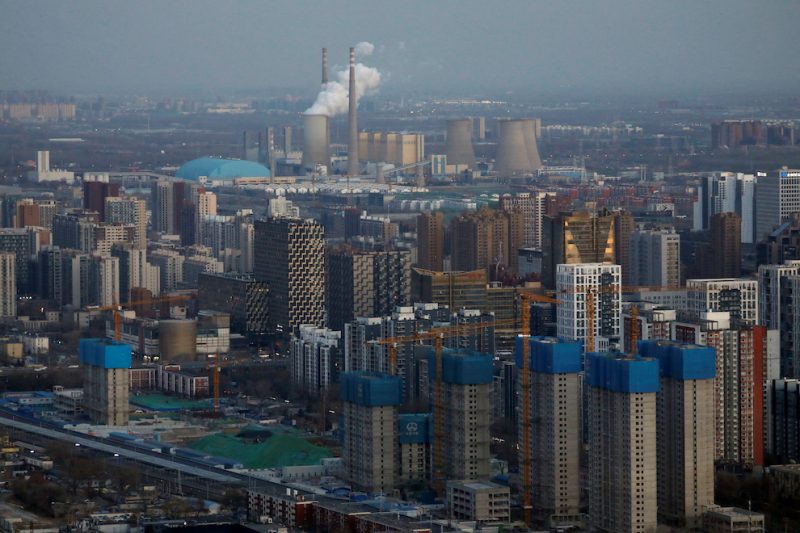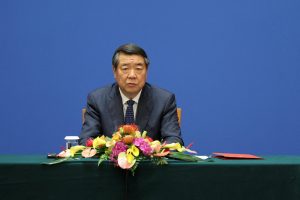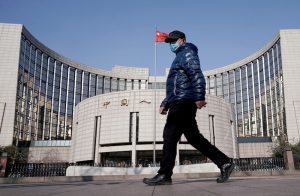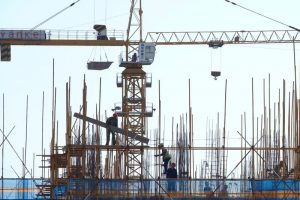China’s protracted property sector crisis has entered its fourth year amid a growing belief that deleveraging of the once–booming sector will turn into a major clearout that only state developers can survive.
Earlier this year there was hope that the “white-list” compiled by local governments would open a line of credit that could help rescue many firms caught in the downturn. But, four months later, there are signs that solution hasn’t worked.
New funding is only coming by the drip, because of deep caution about the outlook for China’s massive residential property market. But, not all the news is negative.
ALSO SEE: Biden Ramps US Tariffs on Chinese EVs, Metals, PV Cells, Chips
Interviews with bankers and developers by Reuters revealed that banks have been reluctant to heed Beijing’s repeated nudges to bolster credit to the embattled sector given the risks of more bad loans.
That has undermined confidence in the sector, which some see as crucial to shoring up a shaky economy.
New loans were only approved since late March, according to the sources, which surprised companies and investors who had expected fresh lending for developers at the start of the ‘white-list’ programme months earlier.
Banks, developers wary amid vast oversupply
The main hurdle to granting more new bank loans is the current weak property market conditions, Lawrence Lu, managing director at S&P Global Ratings, said.
“Developers need to have a project in place to get funding … the issue now is whether the project can generate sufficient cash flow to repay the debt,” he said.
At least six private developers in default received bank approvals for new loans for “white-list” projects since late March, according to one company statement, senior executives of two firms and two others with knowledge of the programme. They asked not to be named because of the private nature of the transactions and the sensitivity of the issue.
New loans were granted for fewer than a handful of projects and lending received so far was equivalent to hundreds of thousands of dollars per project, three of the people said.
That’s just a drop in the ocean given the vast stock of unfinished housing – a Reuters report in March estimated that the “white-list” programme covers projects that need fresh financing of 1.5 trillion yuan ($207.51 billion).
But loans are only granted depending on the progress of construction, the three sources said, adding the volume of approval was “insignificant” given the huge number of uncompleted homes.
The Ministry of Housing and Urban-Rural Development and The National Financial Regulatory Administration did not respond to requests for comment.
Tens of millions of uncompleted apartments
Over the past two years waves of policy measures have failed to turn around a sector that represents a fifth of China’s GDP and remains a major drag on consumer spending.
The slow roll-out of the “white-list” lending reflects the challenge facing Beijing which has pushed banks to speed up approvals of new loans to cash-starved private developers to complete their projects.
Under the “white-list” mechanism launched in January, local governments nominate projects and state-owned as well as commercial banks are encouraged to provide lending.
By March-end, banks had approved the equivalent of $72 billion in loans for 2,100 housing projects, state media reported.
But developers and bankers said many of these approvals simply restarted existing loans, rather than providing new credit.
Estimates vary widely, but analysts agree there are tens of millions of uncompleted apartments across China after a building boom turned to bust with the failure of developers like Evergrande. There is no public data available on the scale and terms of lending under the “white-list” policy.
Shanghai-based CIFI Holdings said in a stock exchange filing in late April a project in the southeastern city of Wuhu became its first to be granted new financing equivalent to over $20 million in total.
Some 68 of its projects had been shortlisted for the list as of end-April, it said in a statement, while 29 of them had received banks’ approval for adjusting existing loans or new loans, allowing it to save 120 million yuan in interest costs a year.
Jinke Property said on its official WeChat account that 83 of its projects had been added to the “white-list” as of end-April, while only six of them had received financing. It did not specify if those were existing or new loans.
‘White-list’ seen as bad deal; banks push back
One of the six private developers whose projects got bank approval said it had decided not to accept the help.
“We think it’s a bad deal because financing incurs interest,” a senior executive at the developer said. “Once we use the ‘whitelist’ loans we have to complete the construction. However, we’re not able to sell all of the units under this bad market so it’s only increasing costs for us.”
The “white-list” policy requires loans to be kept in an escrow account for selected projects to ensure their completion. They cannot be redeployed to repay other debts.
Some bankers said they would continue to push back on the “white-list” directive by negotiating with officials and explaining the shortcomings in some of the projects.
“For banks it’s impossible to actively promote such loss-making business. If we did so, we would face the punishment of surging non-performing loans as well,” one banker said.
China’s central and local governments are pushing ahead with policies intended to clear the stock of unsold housing. Large cities, like Beijing and Shenzhen, have eased home purchase restrictions, and some are allowing homebuyers to “swap” to a new home from an old one.
Private data showed China’s average daily home sales during the major May Day public holiday sank 47% year-on-year, following a 45% drop for the whole of April, underscoring the massive task authorities face to spur home purchases.
“There may be a gap between what the market expects versus what is actually happening,” Gary Ng, senior economist at Natixis Corporate and Investment Bank, said. “How things are implemented is probably the biggest challenge in the coming months.”
However, the Politburo, which met late last month, appears to have recognized that a solution is needed, partly because state-owned builders such as China Vanke are in distress, as well as the need to bolster consumer confidence.
Caixin said in a report on Monday that the government “is considering new strategies such as creating a national real estate investment vehicle to absorb unsold properties.”
But whatever Beijing ends up doing, it will be costly and it could still take some time.
- Reuters with additional input and editing by Jim Pollard
ALSO SEE:
Two More Big Chinese Cities Scrap Home Buying Restrictions
China Home Sales Plunge by Half During May Day Holiday
PwC Probed For ‘Enabling Evergrande Misconduct For Years’
Evergrande Founder Banned, Unit Fined For Securities Fraud
China Evergrande Liquidators May Sue Its Auditor PwC: Report
China Chops Mortgage Benchmark Rate to Boost Property Market
Mortgage Delinquencies in China Soared by 43% in 2023
China’s Property Sector Will Remain Weak For Years: Goldman
























